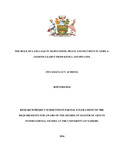| dc.contributor.author | Achieng, Lucy, O | |
| dc.date.accessioned | 2017-01-11T08:45:32Z | |
| dc.date.available | 2017-01-11T08:45:32Z | |
| dc.date.issued | 2016 | |
| dc.identifier.uri | http://hdl.handle.net/11295/100287 | |
| dc.description.abstract | Peace initiatives within states have evolved to counter the ever increasing intra and inter-state conflict situations. Scholars and researcher have lobbied for the positioning of language in upcoming policies to boost state security. The aim of this study was to examine how language affects the security of Kenya and Rwanda; two African countries. The research was driven by the increases in the use of language that is deemed a threat to the security in Kenya, in the pretext of freedom of expression. The setting provided by the Rwanda genocide is used to illustrate the potential danger that countries like Kenya would face in the case of uncontrolled misuse of the Freedom of Expression. The researcher primarily sought to examine how the use of language affects security and stability in two African countries, Kenya and Rwanda. Both qualitative and quantitative techniques of data collection and analysis were employed. However, primary data was collected from Kenya with supplementing literature to give more details into the subject. Collection of Primary data targeted the general Kenyan population with a sample size of 100 Kenyans from five different counties being utilized. Primary data was collected through the use of questionnaires. Data from the Rwanda case study was obtained from secondary sources including documented evidence from ICTR. The effectiveness of the different legal provisions that cover the subject was also considered. One of the core findings was on the importance of dialogue. Dialogue is needed between citizens, civil societies and the government in order to fully understand the context, challenges and roles of all actors in ensuring that the population exercises he freedom of expression in a responsible manner. Finally the study has given recommendations on measures and strategies that may be used and thus contribute towards peace and security in the two subject countries. | en_US |
| dc.language.iso | en | en_US |
| dc.publisher | University of Nairobi | en_US |
| dc.rights | Attribution-NonCommercial-NoDerivs 3.0 United States | * |
| dc.rights.uri | http://creativecommons.org/licenses/by-nc-nd/3.0/us/ | * |
| dc.subject | The Role of Language in Maintaining Peace and Security | en_US |
| dc.title | The Role of Language in Maintaining Peace and Security in Africa-lessons Learnt From Kenya and Rwanda | en_US |
| dc.type | Thesis | en_US |



